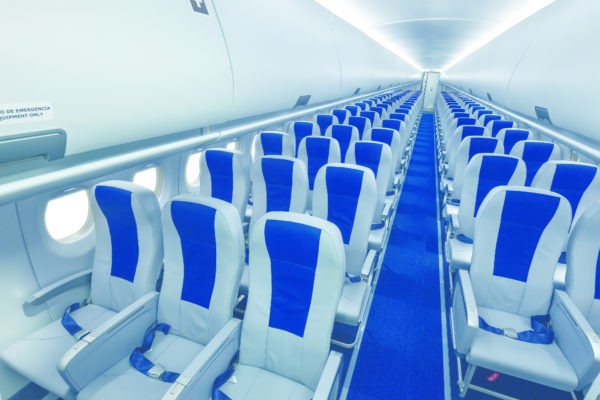
Courtesy: SuperJets International
If you’re like most airline passengers you’ve said to yourself, “How can these seats get any smaller?” only to watch them shrink to child-size proportions while fares stay the same.
On March 9, legislators on both sides of the aisle,* introduced the Seat Egress in Air Travel (SEAT) Act in the U.S. House of Representatives and U.S. Senate.
The Act, if passed (which some say is unlikely given the current establishment’s take on regulation and the fact that similar legislation was defeated last year) would establish a minimum seat size on commercial airlines as well as a minimum distance between rows of seats to protect the safety and health of airline passengers.
“The number one complaint I hear from travelers is shrinking legroom and cramped seats,” said U.S. Senator Charles Schumer in a joint-released press statement. “Consumers are tired of being packed into airplanes like sardines while the airlines are cruising on record profits thanks to consolidation and super-low fuel prices. It’s just plain unfair that a person gets charged for extra legroom inches that were once standard.”
Senator Dianne Feinstein, in the same release said, “This bill isn’t just about comfort, it’s about creating safer conditions for millions of travelers. It protects consumers from being dangerously packed into planes, while also giving them the tools necessary to make informed seating choices when booking flights.”
Seat distance, or “pitch,” has shrunk from 35 inches prior to airline deregulation in the ’70s to 31 inches today. Seat width has disappeared as well. In the days of the 747s seat width was about 18 inches and today it barely gets to about 16 1/2.
One day prior to the SEAT Acts introduction, on March 8, the Ranking Member of the House Committee on Transportation and Infrastructure Peter DeFazio (D-OR) and the Ranking Member of the Subcommittee on Aviation Rick Larsen (D-WA) introduced H.R. 1420, the Know Before You Fly Act.
This legislation would protect travelers during flight delays and cancellations due to airline computer systems failures. It also wants to clarify hidden fees for passengers.
“Unexpected fees and lengthy delays are two surefire ways to ruin someone’s trip,” said Larsen in a press statement,. “By requiring airlines to be more transparent about baggage fees and how they will help passengers affected by large-scale network meltdowns, this bill would institute long-overdue consumer protections for folks who fly.”
Both bills would have to be managed by the Federal Aviation Authority, an organization that has already seen itself in President Donald Trump’s crosshairs.
In February, the website Politico reported that the President criticized current FAA Administer, Michael Huerta (an Obama appointee), saying: “…The gentleman who’s the head of the FAA right now not a pilot? I’d like to find out because I think it maybe would be good to have a pilot — like a really good pilot that knows what’s going on. … I would think you need a very sophisticated person in that job.”
Bottom line for passengers: If you support the legislation get vocal with your representatives because regulation is going to have a middle seat in the back of the plane in the new administration.
*Congressman Steve Cohen (D-TN), Congressman Adam Kinzinger (R-IL), Senator Richard Blumenthal (D-CT), Senate Minority Leader Charles Schumer (D-NY), Senator Ed Markey (D-MA), Senator Bob Menendez (D-NJ), and Senator Dianne Feinstein (D-CA)





